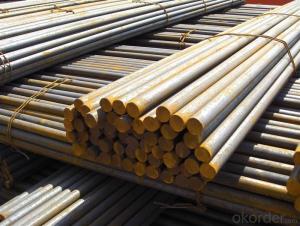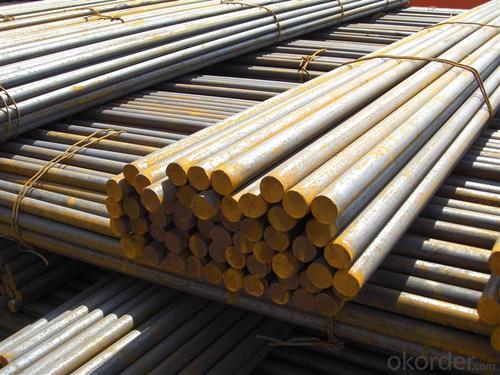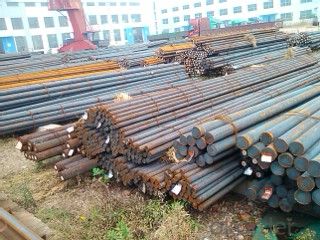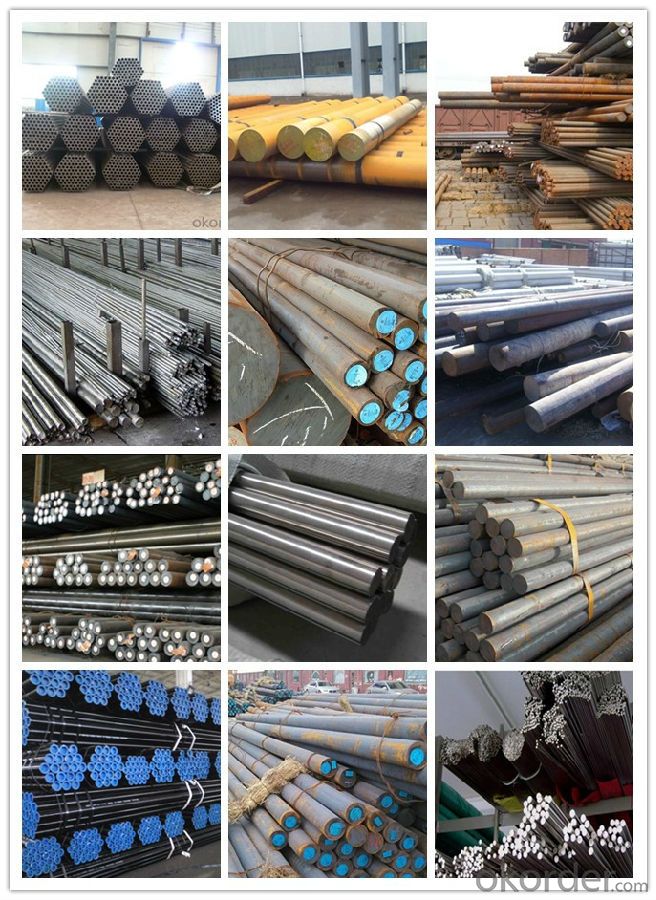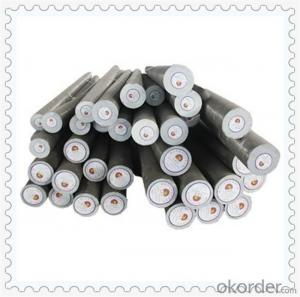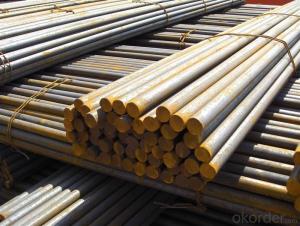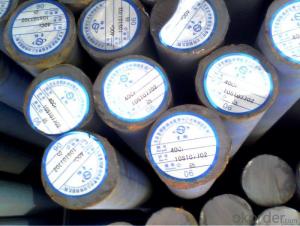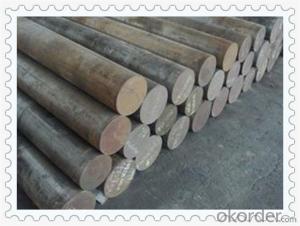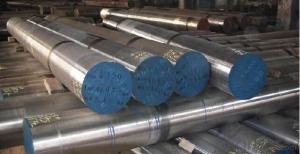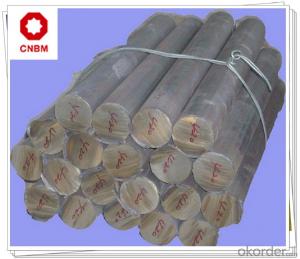Structural Alloy Steel Round Bar S235JR Special Steel
- Loading Port:
- China main port
- Payment Terms:
- TT OR LC
- Min Order Qty:
- 30 m.t.
- Supply Capability:
- 10000 m.t./month
OKorder Service Pledge
OKorder Financial Service
You Might Also Like
Specification
Structural alloy steel round bar s235jr
Characteristics
1) Even material.
2) Good machinability and polishability.
3) High toughness and high plasticity.
4) High abrasive resistance in high temperature.
5) Excellent total hardenability.
6) Low deformability during heat treatment.
7) Better isotropy.
Application
1) Diecasting mould(mold, fixed block, upper die, jet nozzle, nitride thimble ).
2) Extrusion die(mold, supporting member, choke blocks).
3) Hot press die. (aluminum, magnesium, copper alloy)
4) Parts, such as cold cutting, overlap, hot shears, wearable parts.
5) Important parts for aviation industry.
Main Product
Carbon Steel Round Bar | SS400, S235JR,Q235, ASTM A36, Fe360A, Fe360B,SM400A,080A15, SS41,E235B |
SAE 1020, AISI 1020, ASTM 1020, S20C, 20#, 050A20 | |
SAE 1045, AISI 1045, ASTM 1045, S45C, 45#,EN8, XC45, XC48, 45B, C45, CK45, CM45, 060A47, R683/IC45e | |
Alloy Steel Round Bar | 40Cr, DIN 1.7035, SAE 5140, AISI 5140, ASTM 5140, SCr440, 41Cr4, 530A40, 42Cr4, 40X, R683/VII3 |
SAE4140,42CrMo, 42CrMo4, DIN 1.7225, SCM440,EN19, 42CD4, 708M40, R683/II3 | |
SAE 4340, 40CrNiMoA, EN24, SNCM439, 817M40,40XMA, R683/III4 | |
SAE 8620,,AISI 8620, ASTM 8620, 20CrNiMo,SNCM220, 805M20 | |
SAE52100, AISI52100,ASTM E52100, GCr15, SUJ2, 100C6, 100Cr6, 1.3505, 534A99, IIIX15 |
Product show
Workshop show
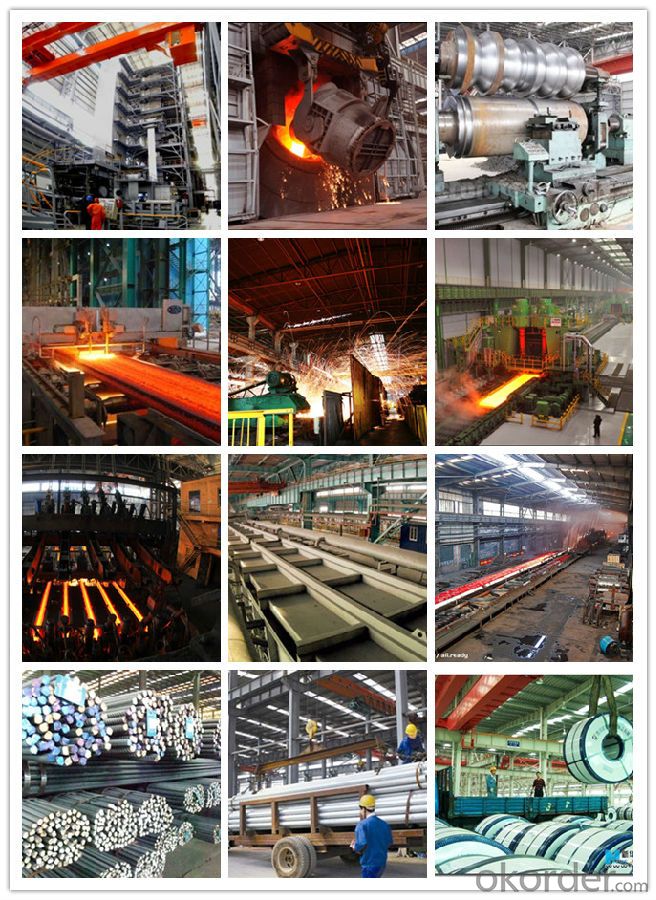
Shipping
1. FedEx/DHL/UPS/TNT for samples, Door-to-Door;
2. By Air or by Sea for batch goods, for FCL; Airport/ Port receiving;
3. Customers specifying freight forwarders or negotiable shipping methods!
Delivery Time: 3-7 days for samples; 5-25 days for batch goods.
Payment Terms
1.Payment: T/T, L/C, Western Union, MoneyGram,PayPal; 30% deposits; 70% balance before delivery.
2.MOQ: 1pcs
3.Warranty : 3 years
4.Package Informations: 1) EXPORT, In 20 feet (GW 25 ton) or 40 feet Container (GW 25 ton)
2)as customer's requirement
Why choose us?
(1) The leading exporter in China special steel industry.
(2) Large stocks for various sizes, fast delivery date.
(3) Good business relationship with China famous factories.
(4) More than 7 years steel exporting experience.
(5) Good after-sales service guarantee.
- Q: What are the main applications of special steel in the defense aircraft?
- Special steel is widely used in defense aircraft for various critical applications. Some of the main applications include the manufacturing of aircraft structural components, such as landing gear, wing spars, and fuselage frames, which require high strength, durability, and resistance to fatigue and corrosion. Special steel is also used for producing engine components, like turbine blades, which require high-temperature resistance and excellent mechanical properties. Additionally, special steel is utilized in the production of armor plating for protection against ballistic threats, reinforcing the overall security and survivability of the aircraft.
- Q: What are the main applications of special steel in the pharmaceutical industry?
- Special steel is widely used in the pharmaceutical industry for various applications. One of the main applications is in the manufacturing of high-quality equipment such as tanks, vessels, and pipes that are required for the storage and transportation of pharmaceutical products. Special steel is preferred due to its corrosion resistance, durability, and ability to maintain product purity. Additionally, special steel is utilized in the production of precision tools and instruments used in pharmaceutical research, development, and quality control processes. Moreover, special steel is essential in the construction of cleanrooms and controlled environments, ensuring the hygienic and sterile conditions required in pharmaceutical manufacturing.
- Q: What are the different types of welding techniques used for special steel?
- Special steel can be welded using various techniques depending on its specific requirements and properties. Some commonly used techniques for welding special steel include: 1. Stick welding, also known as Shielded Metal Arc Welding (SMAW), involves using a consumable electrode coated in flux to create an electric arc between the electrode and the base metal. This technique is ideal for thicker sections of special steel due to its ability to generate high heat and deep penetration. 2. Gas Metal Arc Welding (GMAW), also known as MIG welding, utilizes a continuously fed wire electrode and a shielding gas to protect the weld from atmospheric contamination. Its versatility and ability to produce high-quality welds with good control make it widely used for special steel. 3. Gas Tungsten Arc Welding (GTAW), also known as TIG welding, employs a non-consumable tungsten electrode and a shielding gas to create an electric arc. This technique is often preferred for special steel alloys that require precise control over the welding process and where weld quality and appearance are crucial. 4. Flux-Cored Arc Welding (FCAW), similar to GMAW, employs a continuously fed tubular electrode filled with flux. This technique is commonly used for special steel applications that necessitate high deposition rates and deep penetration, such as heavy fabrication or structural welding. 5. Submerged Arc Welding (SAW) involves creating an arc between a continuously fed bare electrode and the workpiece, while a layer of granular flux covers the arc. This technique is typically used for heavy-duty applications and thick materials, providing excellent weld quality and high deposition rates. 6. Laser Beam Welding (LBW) utilizes a highly focused laser beam to melt and join special steel parts. It offers precise control, high welding speeds, and minimal distortion, making it suitable for specialized applications that require high precision and minimal heat-affected zones. It is crucial to consider factors such as material composition, thickness, joint configuration, and desired weld properties when selecting the appropriate welding technique for special steel. Expertise and knowledge are essential to determine the best technique for a specific application, ensuring optimal results in terms of weld quality, strength, and durability.
- Q: What are the main characteristics of alloy steel forgings?
- Alloy steel forgings possess a multitude of desirable qualities that make them highly sought-after in diverse industries. Firstly, their exceptional strength and durability are widely recognized. By incorporating various alloying elements like chromium, nickel, molybdenum, and vanadium, the mechanical properties of the steel are enhanced, resulting in resistance to wear, fatigue, and corrosion. Another notable characteristic of alloy steel forgings is their remarkable versatility. These forgings can be tailored to meet specific requirements in terms of shape, size, and performance. This adaptability enables the production of intricate and complex components, often utilized in critical applications such as aerospace, automotive, and oil and gas industries. Furthermore, alloy steel forgings exhibit excellent heat resistance, maintaining their structural integrity even under extreme temperature fluctuations. This attribute proves highly advantageous in applications where components are exposed to high temperatures or rapid temperature changes, like gas turbines, boilers, and heat exchangers. Moreover, alloy steel forgings offer superior machinability and weldability, simplifying the manufacturing process. This quality facilitates precise shaping, forming, and machining, enabling manufacturers to achieve intricate designs and tight tolerances. Lastly, alloy steel forgings are renowned for their cost-effectiveness. Despite their exceptional properties, these forgings can be produced in large quantities, resulting in economies of scale. This makes them a cost-efficient choice for industries seeking a balance between performance, durability, and affordability. In conclusion, the key characteristics of alloy steel forgings include outstanding strength, durability, versatility, heat resistance, machinability, weldability, and cost-effectiveness. These qualities establish alloy steel forgings as the preferred choice for applications requiring high-performance components that can withstand challenging conditions.
- Q: How is special steel used in the railway supply chain?
- Special steel is used in the railway supply chain for various applications such as manufacturing railway tracks, wheels, axles, and components. It offers superior strength, durability, and resistance to wear and tear, ensuring safe and efficient transportation. Special steel's unique properties make it an essential material in constructing reliable and high-performance railway infrastructure.
- Q: What are the requirements for special steel used in power plants?
- Given the critical role that these materials play in ensuring the safe and efficient operation of power generation facilities, the requirements for special steel used in power plants are specific and stringent. Here are some of the key requirements: 1. Withstanding high temperatures: Special steel used in power plants must maintain its structural integrity even at elevated temperatures, especially in areas like the combustion chamber or steam turbines. 2. Excellent corrosion resistance: Power plants often operate in environments with high levels of moisture, chemicals, and other corrosive elements. Special steel must be able to resist corrosion to prevent degradation and premature failure. 3. High strength and toughness: Power plants generate substantial amounts of energy, so the components made of special steel must be strong and tough enough to withstand mechanical stresses and loads. This includes resistance to fatigue, creep, and stress corrosion cracking. 4. Good weldability: Welding is often necessary during the fabrication or maintenance of power plant components. Special steel should have good weldability to ensure strong and reliable joints that maintain the overall system's structural integrity. 5. Low thermal expansion: Special steel used in power plants should have low thermal expansion properties to minimize the risk of thermal stress and distortion caused by temperature variations during operation. This prevents premature failure and ensures dimensional stability. 6. Resistance to radiation: In some power plants, such as nuclear facilities, special steel may be exposed to radiation. Therefore, the steel should have good resistance to radiation damage, ensuring long-term performance and safety. 7. Compliance with industry standards: Special steel used in power plants must meet specific industry standards and codes to ensure quality, reliability, and safety. These standards may include ASTM, ASME, or ISO, among others. Overall, the requirements for special steel used in power plants are driven by the need for high temperature resistance, corrosion resistance, strength, weldability, low thermal expansion, radiation resistance, and compliance with industry standards. Meeting these requirements ensures the integrity and longevity of power plant components, contributing to the safe and efficient generation of electricity.
- Q: What are the different food processing grades of special steel?
- There are several different food processing grades of special steel that are commonly used in the food industry. These grades are specifically designed to meet the strict requirements of food processing, ensuring the safety and quality of the products. One of the most commonly used food processing grades of special steel is AISI 304 stainless steel. This grade is known for its excellent corrosion resistance, making it suitable for use in environments where food is being processed. It is also highly resistant to chemicals and acids, further enhancing its suitability for food processing applications. Another grade frequently utilized in the food industry is AISI 316 stainless steel. This grade offers even better corrosion resistance than AISI 304 and is often used in applications where the equipment comes into direct contact with food or food-related substances. AISI 316 stainless steel is also resistant to high temperatures, making it suitable for use in heat-intensive food processing operations. Additionally, there are food processing grades of special steel that are specifically designed for use in environments with high hygiene requirements. These grades, such as AISI 316L and 1.4404, have a smoother surface finish, which helps to prevent the buildup of bacteria and facilitate easier cleaning. Overall, the different food processing grades of special steel offer various levels of corrosion resistance, temperature resistance, and hygiene properties. These qualities ensure that the steel used in food processing equipment is durable, safe, and meets the strict standards of the industry.
- Q: Can special steel be coated?
- Yes, special steel can be coated. Coatings can provide various benefits such as corrosion resistance, improved aesthetics, and enhanced durability to special steel.
- Q: How is special steel used in the telecommunications industry?
- Special steel is used in the telecommunications industry for various applications, such as the construction of transmission towers, antenna supports, and satellite equipment. Its high strength, corrosion resistance, and durability make it ideal for withstanding harsh environmental conditions and ensuring the stability and reliability of telecommunications infrastructure.
- Q: Can special steel be coated or plated?
- Yes, special steel can be coated or plated to enhance its properties or provide additional protection against corrosion or wear.
Send your message to us
Structural Alloy Steel Round Bar S235JR Special Steel
- Loading Port:
- China main port
- Payment Terms:
- TT OR LC
- Min Order Qty:
- 30 m.t.
- Supply Capability:
- 10000 m.t./month
OKorder Service Pledge
OKorder Financial Service
Similar products
Hot products
Hot Searches
Related keywords
